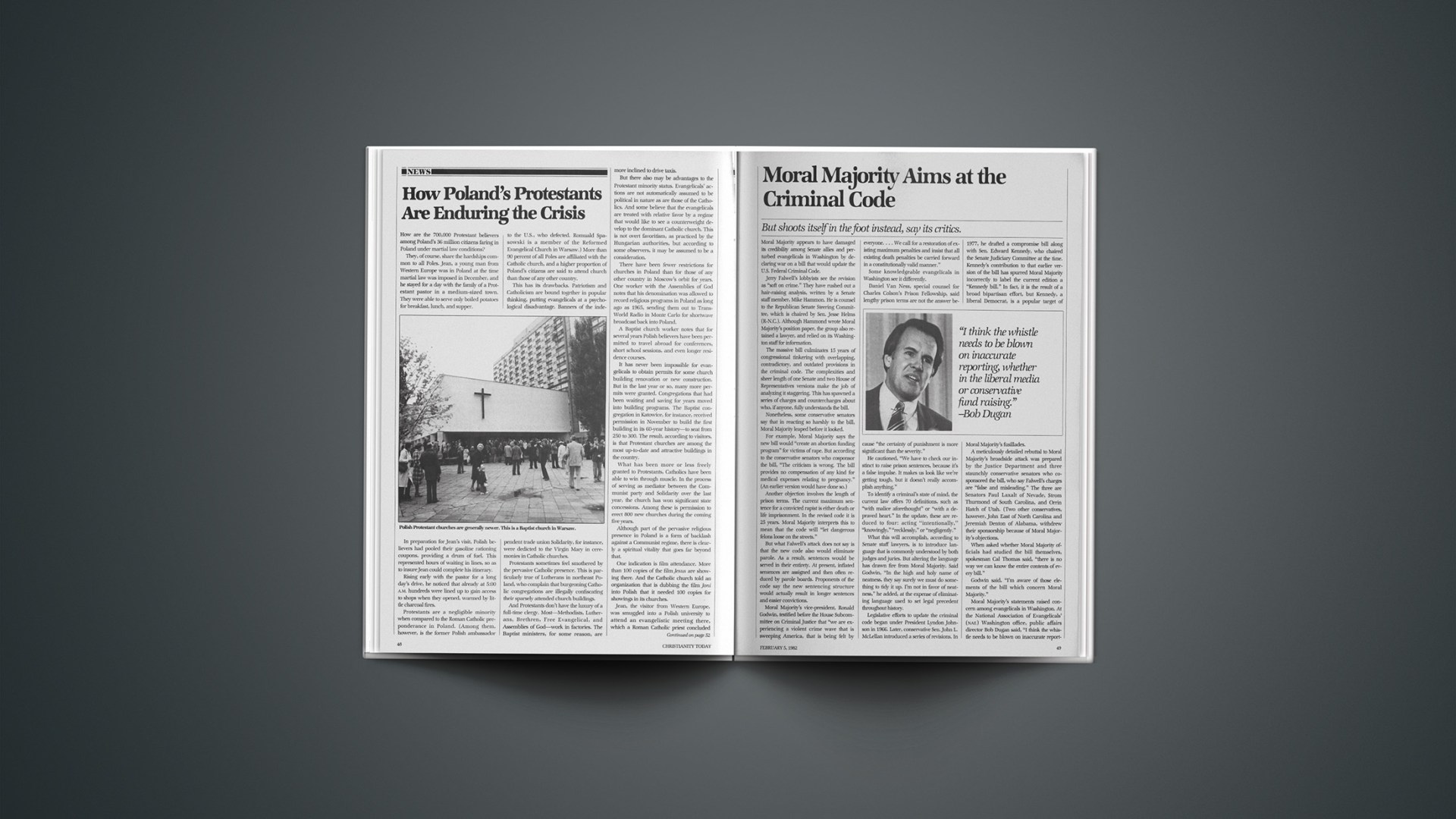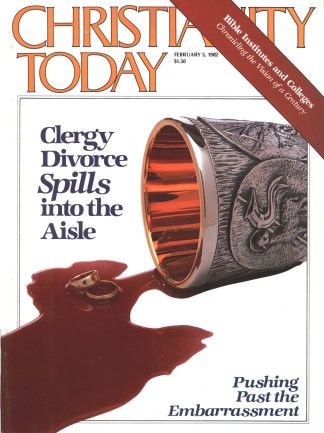How are the 700,000 Protestant believers among Poland’s 36 million citizens faring in Poland under martial law conditions?
They, of course, share the hardships common to all Poles. Jean, a young man from Western Europe was in Poland at the time martial law was imposed in December, and he stayed for a day with the family of a Protestant pastor in a medium-sized town. They were able to serve only boiled potatoes for breakfast, lunch, and supper.
In preparation for Jean’s visit, Polish believers had pooled their gasoline rationing coupons, providing a drum of fuel. This represented hours of waiting in lines, so as to insure Jean could complete his itinerary.
Rising early with the pastor for a long day’s drive, he noticed that already at 5:00 A.M. hundreds were lined up to gain access to shops when they opened, warmed by little charcoal fires.
Protestants are a negligible minority when compared to the Roman Catholic preponderance in Poland. (Among them, however, is the former Polish ambassador to the U.S., who defected. Romuald Spasowski is a member of the Reformed Evangelical Church in Warsaw.) More than 90 percent of all Poles are affiliated with the Catholic church, and a higher proportion of Poland’s citizens are said to attend church than those of any other country.
This has its drawbacks. Patriotism and Catholicism are bound together in popular thinking, putting evangelicals at a psychological disadvantage. Banners of the independent trade union Solidarity, for instance, were dedicted to the Virgin Mary in ceremonies in Catholic churches.
Protestants sometimes feel smothered by the pervasive Catholic presence. This is particularly true of Lutherans in northeast Poland, who complain that burgeoning Catholic congregations are illegally confiscating their sparsely attended church buildings.
And Protestants don’t have the luxury of a full-time clergy. Most—Methodists, Lutherans, Brethren, Free Evangelical, and Assemblies of God—work in factories. The Baptist ministers, for some reason, are more inclined to drive taxis.
But there also may be advantages to the Protestant minority status. Evangelicals’ actions are not automatically assumed to be political in nature as are those of the Catholics. And some believe that the evangelicals are treated with relative favor by a regime that would like to see a counterweight develop to the dominant Catholic church. This is not overt favoritism, as practiced by the Hungarian authorities, but according to some observers, it may be assumed to be a consideration.
There have been fewer restrictions for churches in Poland than for those of any other country in Moscow’s orbit for years. One worker with the Assemblies of God notes that his denomination was allowed to record religious programs in Poland as long ago as 1965, sending them out to Trans-World Radio in Monte Carlo for shortwave broadcast back into Poland.
A Baptist church worker notes that for several years Polish believers have been permitted to travel abroad for conferences, short school sessions, and even longer residence courses.
It has never been impossible for evangelicals to obtain permits for some church building renovation or new construction. But in the last year or so, many more permits were granted. Congregations that had been waiting and saving for years moved into building programs. The Baptist congregation in Katowice, for instance, received permission in November to build the first building in its 60-year history—to seat from 250 to 300. The result, according to visitors, is that Protestant churches are among the most up-to-date and attractive buildings in the country.
What has been more or less freely granted to Protestants, Catholics have been able to win through muscle. In the process of serving as mediator between the Communist party and Solidarity over the last year, the church has won significant state concessions. Among these is permission to erect 800 new churches during the coming five years.
Although part of the pervasive religious presence in Poland is a form of backlash against a Communist regime, there is clearly a spiritual vitality that goes far beyond that.
One indication is film attendance. More than 100 copies of the film Jesus are showing there. And the Catholic church told an organization that is dubbing the film Joni into Polish that it needed 100 copies for showings in its churches.
Jean, the visitor from Western Europe, was smuggled into a Polish university to attend an evangelistic meeting there, which a Roman Catholic priest concluded by giving an invitation.
Recently a rumor surfaced that the Polish Bible Society had received a shipment of Polish-language Bibles from the British and Foreign Bible Society. Hundreds of Poles promptly queued up—students, army officers, housewives, and so on—all prepared to part with the 350-zloty price of a Bible, equal to about a half-week’s wages for a laborer.
Keeping spiritual revival and political renewal separate may not be possible. While Protestants have generally avoided taking political stands as church bodies, observers say that many believers were individually members of Solidarity.
Polish Ecumenical Council (PEC) general secretary Pawlik was summoned in early January to meet with Archbishop Jozef Glemp and also with the head of the Department of Religion at the Interior Ministry. He is reported to have told the Catholic primate that the PEC would not be overtly involved in political affairs as are the Catholics. What transpired at the Interior Ministry is unknown.
Of course, the Communist regime has to reckon with the powerful grip of the Roman Catholic church on the Polish citizenry. Western officials monitoring broadcasts from Poland noted that the traditional Sunday morning Mass broadcast from the Church of the Holy Cross in Warsaw was not aired on December 20. But in short order, the authorities were repeatedly broadcasting the sermon delivered by Archbishop Glemp on the night of the crackdown, appealing for the people to avoid violence, even though it also condemned martial law itself as evil and a violation of human rights.
Roman Catholic churchmen quickly set up an ad hoc “crisis staff” to create and maintain some links with the authorities. They refused to negotiate with the military rulers, however, without Lech Walesa present. And he refused unless the full Solidarity secretariat could be included with him. Reportedly, its proposal to have Walesa removed from state custody in Warsaw to its protection in a secluded monastery was nearly accepted. But the state dropped the idea after Glemp’s January 6 Epiphany sermon, in which he strongly attacked the official policy of extorting “loyalty pledges” from people in exchange for security or jobs. Such a policy, said the archbishop, is “a violation of human conscience” and incompatible with the church’s teaching.
One Christian worker from Eastern Europe predicts that by not taking sides, the Protestant church will emerge from Poland’s current travail relatively stronger in relation to its dominant sister church.










